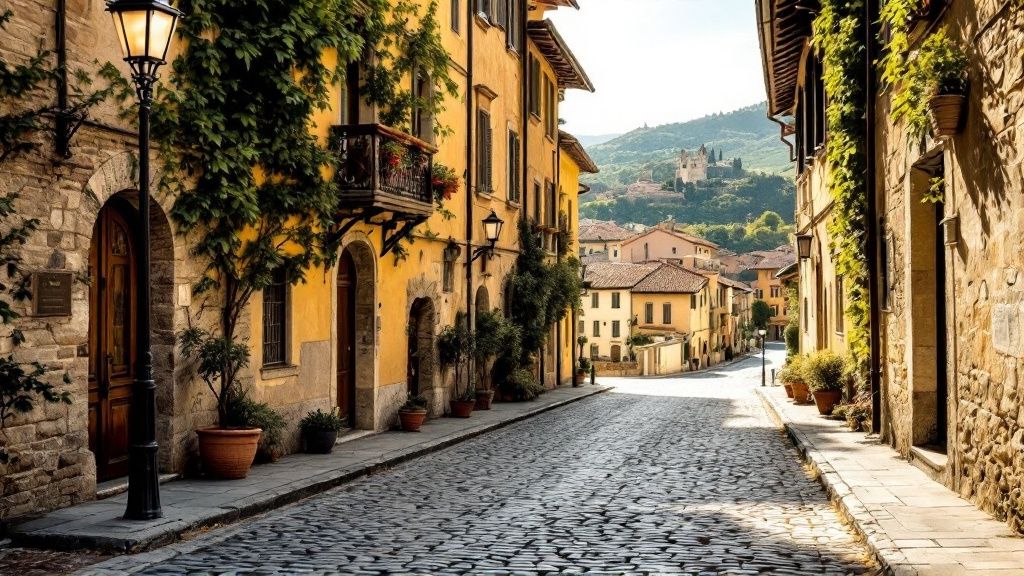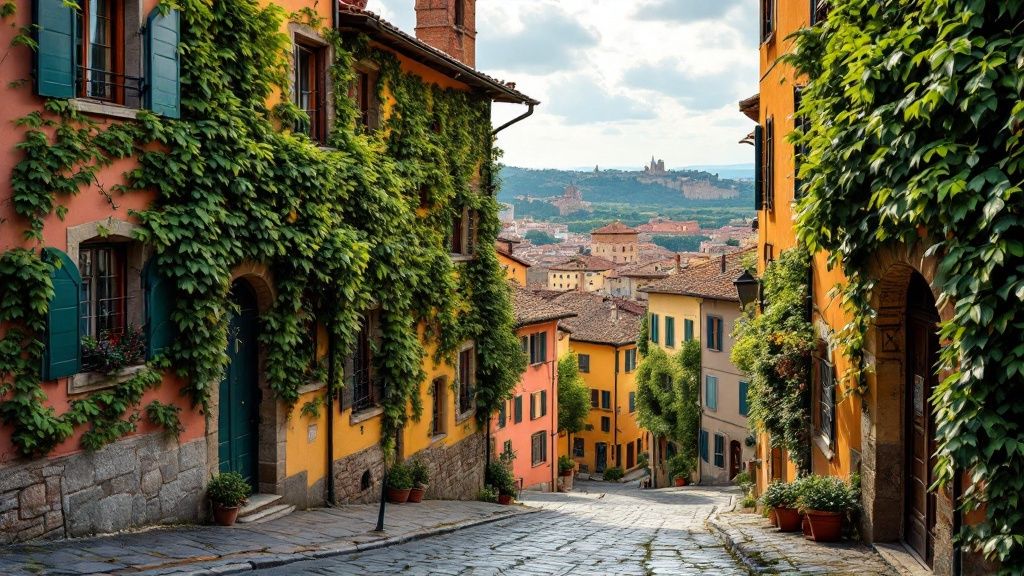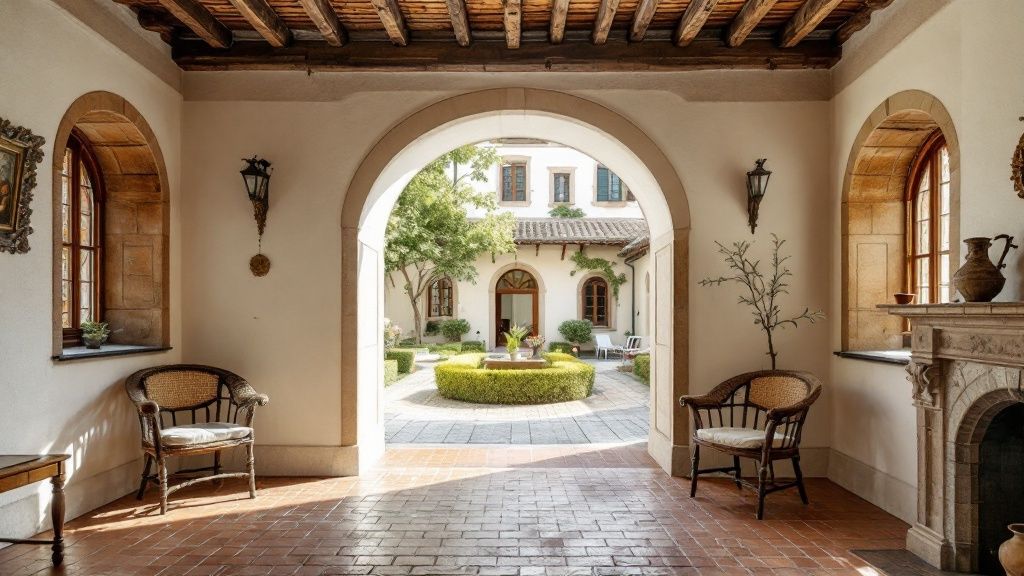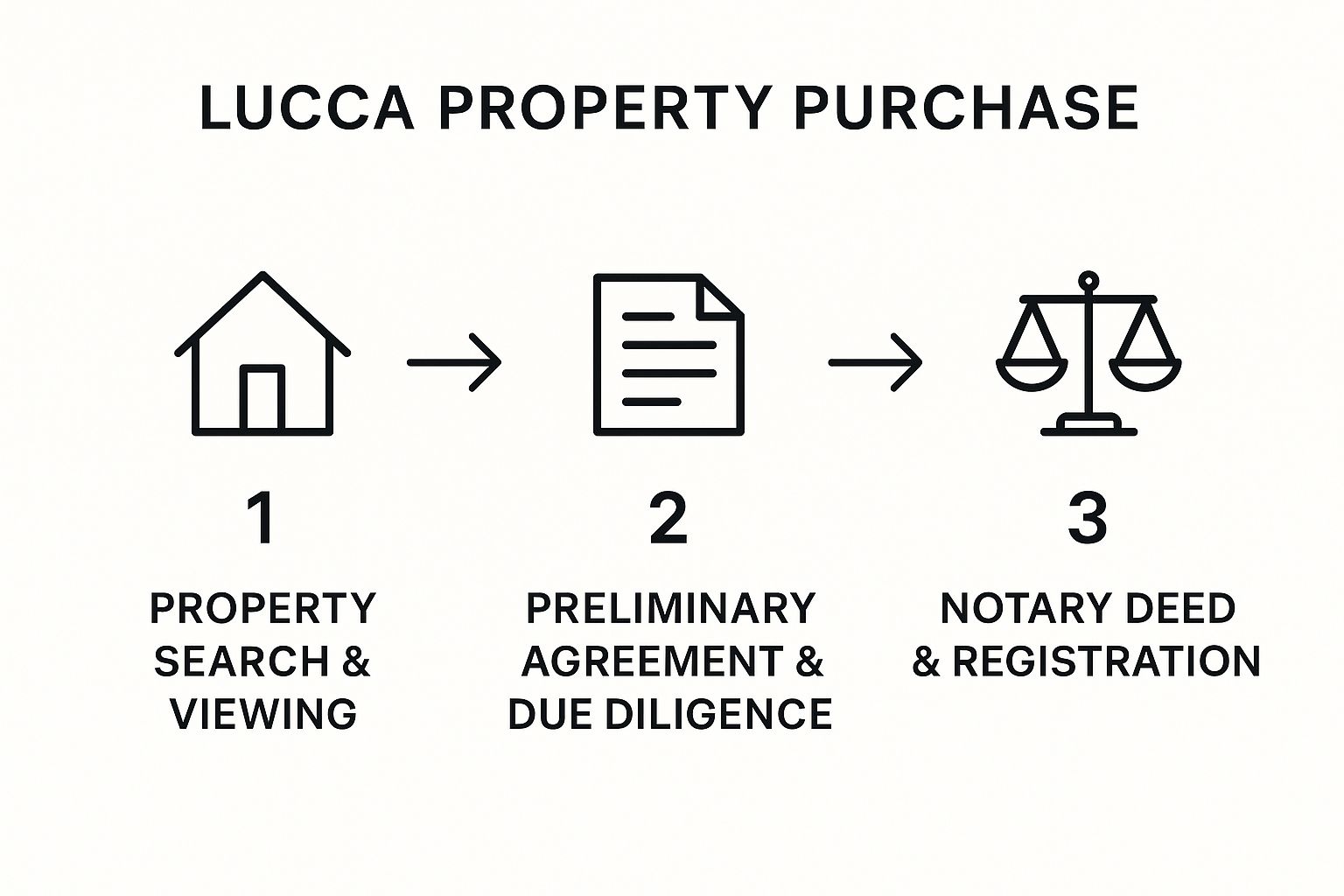Real Estate Lucca: Your Expert Guide to Property Listings

Imagine living within ancient Renaissance walls, strolling down cobblestone streets, and soaking up the perfect blend of historical charm and modern Tuscan life. The real estate in Lucca is more than just property; it's an investment in a way of life that feels both culturally rich and surprisingly livable—a combination that really sets it apart from other Italian cities.
Why Lucca is the Perfect Spot for Your Italian Dream Home
When people think of Tuscany, they often picture rolling hills and rustic farmhouses. Lucca, however, offers something wonderfully different that continues to capture the hearts of savvy international buyers.
This is a city where history isn't just something you see in a museum; it's a living, breathing part of your day. The famous city walls, once a formidable defense, are now a beloved public park. That's a perfect metaphor for Lucca itself: historic and strong, yet incredibly open and welcoming.
Unlike the tourist-heavy hubs of Florence or Siena, Lucca has managed to hold onto a more relaxed, authentic atmosphere. This makes it a fantastic choice for anyone who wants to experience genuine Italian life without giving up convenience or culture. It’s a city built for walking, where local markets, artisan shops, and incredible restaurants are always just around the corner. This unique mix is a huge part of what’s driving the growing interest in its property market.
It's More Than a House, It's a Lifestyle
Putting your money into Lucca real estate isn't just about acquiring an asset; it’s about buying into an exceptionally high quality of life. The city’s vibrant cultural calendar is a huge part of its appeal.
-
Cultural Vibrancy: Lucca is famously the birthplace of composer Giacomo Puccini, and music is woven into its fabric. It also hosts the renowned Lucca Summer Festival, which draws international music acts and fills the city with an incredible energy all season long.
-
Surprising Livability: Don’t let the historical setting fool you. Lucca is a practical, modern city with excellent amenities, good schools, and reliable healthcare. Its location is also a major plus, offering easy access to Pisa International Airport, the sandy beaches of the Versilia coast, and the stunning mountains of Garfagnana.
Owning property in Lucca means you're not just buying a home. You're securing a piece of a lifestyle that balances historical elegance with modern comfort—a truly rare find in today's world.
This unique combination of factors makes the real estate Lucca offers a stable and rewarding choice, whether for personal use or as a long-term investment. It promises not just a beautiful home but a richer, more fulfilling way of life, attracting more and more international buyers searching for their own Italian dream.
A Closer Look at the Lucca Property Market

Jumping into the real estate market in Lucca is about more than just admiring its beauty; it's about learning to read the market's pulse. Think of it like learning the local dialect of property values. You start to see beyond simple price tags and begin to understand the stories they tell about demand, location, and long-term potential.
What makes Lucca so unique is the interplay between its deep-rooted history and the pressures of modern demand. There’s a constant, powerful desire for properties tucked inside the ancient city walls, which has created a very exclusive, premium market. At the same time, the areas just outside the walls and the sprawling countryside open up entirely different kinds of opportunities, making for a fascinating and varied investment landscape.
This balance keeps the market remarkably sturdy. Unlike cities that might hinge on a single property type, Lucca's diverse portfolio—from centuries-old apartments to modern countryside villas—draws a wide net of both Italian and international buyers. This fosters real stability and encourages steady, reliable growth.
Decoding Lucca Property Prices
To get a real handle on the market, you need to focus on the one metric that all pros use: the price per square meter (€/m²). It’s the great equalizer. This simple figure lets you accurately compare a historic apartment in the Centro Storico with a brand-new build in the suburbs, cutting through the noise of different layouts and amenities to reveal the true underlying value.
Let's look at the numbers. The recent data paints a very positive picture for anyone thinking of buying here.
Lucca Real Estate Price Snapshot
The table below breaks down the key figures, showing a market that's not just healthy, but actively growing.
| Metric | Value (€ per sq. meter) | Year-over-Year Change |
|---|---|---|
| Average Asking Price | €2,309 | +5.29% |
| Previous Year's Average | €2,193 | N/A |
| Two-Year Low | €2,102 | N/A |
This steady climb isn't a fluke. The market has been on a consistent upward trend, showing strong, sustained demand from buyers who see the unique value in Lucca's lifestyle and investment appeal. For a deeper dive, you can explore more detailed Tuscan property prices on immobiliare.it.
Supply and Demand: The Two Sides of the Coin
At its core, Lucca's real estate market runs on the classic principle of supply and demand, but with a historical twist you won't find just anywhere. The supply of property, especially within the historic center, is fundamentally fixed. You simply can't build new apartments inside Renaissance-era walls.
This scarcity is the engine that drives value. A property inside the "Mura" isn't just a home; it's a finite piece of history. That makes these properties incredibly sought-after and resilient investments that hold their value exceptionally well, even when the broader market gets shaky.
This dynamic splits the market into a few distinct zones:
- Inside the Walls (Centro Storico): Here, demand consistently overwhelms the very tight supply. This reality pushes prices to a premium and creates fantastic potential for both long-term appreciation and high-yield short-term rentals fueled by tourism.
- Outside the Walls & Immediate Suburbs: These areas are where you'll find more modern homes, often with perks like private parking and gardens. With more properties available, pricing is more competitive, offering great opportunities for family homes or long-term rental investments.
- Countryside Villas & Farmhouses: The rolling hills surrounding Lucca are a market all their own. Buyers here are looking for space, privacy, and that quintessential Tuscan dream. Renovated farmhouses (rustici) are always in high demand, but there are also amazing opportunities for those willing to take on a restoration project.
Understanding these differences is the key to matching your investment goals with the right part of Lucca. Whether you’re drawn to the vibrant energy of the city center or the quiet beauty of the countryside, the real estate in Lucca offers a compelling and financially sound opportunity for anyone ready to look closer.
Discovering Lucca's Best Places to Live

Finding the right spot in Lucca isn't about pointing to a map. It's about matching a location to the life you want to live. Are you picturing yourself amidst the ancient echoes of the historic center? Or is your dream sipping an espresso on a terrace that overlooks the rolling Tuscan hills? The city and its surrounding countryside each have their own distinct personality, and with it, a unique real estate market.
This choice goes beyond the four walls of a house; it's about shaping your daily reality. Imagine stepping out your door onto a bustling medieval street versus waking up to the gentle sounds of the countryside. Both are quintessentially Lucca, but they are worlds apart in experience. Understanding these nuances is the first real step to finding your perfect corner of Tuscany.
The Heart of History: The Centro Storico
Living inside Lucca's famous Renaissance walls—the Centro Storico—is like inhabiting a living museum. This is where you'll find beautifully preserved apartments tucked away in centuries-old palazzi. Many feature original terracotta floors, massive wooden beams, and even the occasional fresco. Life here is vibrant and utterly convenient. Everything you could possibly need, from artisan bakeries to incredible restaurants, is just a short, charming stroll away.
Of course, this unique atmosphere comes at a premium. The demand for property within the walls consistently outpaces the very limited supply, making this the most expensive area to buy real estate in Lucca. You’ll also have to contend with challenges like parking, and many properties require sensitive, well-planned renovations to bring them up to modern standards.
Over the past five years, Lucca has seen property values climb steadily, with an overall price increase of around 27%. The historic center commands the highest prices, with properties generally fetching between €3,575 to €3,659 per square meter. In contrast, areas just outside the walls are significantly more affordable at roughly €1,500 to €1,600 per square meter. This gap really underscores the premium people are willing to pay for that historic charm and prime location.
Just Beyond the Walls: Convenience and Community
Step just outside the city walls, and you'll find a completely different side of Lucca. Neighborhoods like Sant'Anna, San Marco, and Sant'Alessio have a more contemporary residential feel while being just a stone's throw from the historic center. These areas are incredibly popular with local families and strike a great balance between convenience and community.
Here, the property types are more varied and almost always more spacious than what you can find inside the walls. You can expect to see:
- Modern Apartments: Often in newer buildings with amenities like elevators and private parking—a true luxury in Lucca.
- Townhouses (Villette): Many come with small private gardens, giving you a slice of outdoor space without the intense upkeep of a large country home.
- Single-Family Homes: These offer more room for growing families and a more traditional, quiet neighborhood vibe.
This zone represents a fantastic middle ground. You get more space for your money, easier access to big supermarkets and other services, and the charm of the Centro Storico is still just a short bike ride or walk away.
For many international buyers, the neighborhoods just outside the walls offer the perfect compromise. They provide the practicalities of modern living without sacrificing the magical proximity to Lucca's historic heart.
The Rolling Hills: A Tuscan Dream
For those whose Italian dream involves sweeping views, olive groves, and rustic stone farmhouses, the countryside around Lucca is pure paradise. The hills to the north and east of the city are dotted with magnificent villas, charming farmhouses (casali or rustici), and beautifully restored country estates.
This is where you find real space, privacy, and an authentic connection to the Tuscan landscape. Properties here run the gamut from modest country homes in need of a full renovation to luxurious, turnkey villas with swimming pools and acres of land. Investing in a countryside property is a major undertaking, but the rewards are truly immense. For a deeper dive, check out our guide on what to consider when buying a Tuscan villa.
The lifestyle out here is slower, more in tune with the seasons, and offers a peaceful retreat from the city buzz. The best part? You're rarely more than a 15-20 minute drive from the center of Lucca, so you never feel isolated. This blend of rural tranquility and easy urban access is one of the most compelling things the real estate Lucca has to offer.
Your Step-by-Step Guide to Buying Property in Italy
At first glance, the Italian property-buying process can seem like a complex dance of legal steps and unfamiliar terms. But once you have a clear roadmap, it all falls into place. This guide will break down the essential stages, turning what might feel like bureaucratic hurdles into simple, manageable steps for anyone looking to invest in real estate in Lucca.
Think of it like building a bridge to your new Italian home. Each step is a foundational pillar that makes sure the final structure is secure, legally sound, and exactly what you've been dreaming of. From getting your personal Italian tax code to the final handshake, we'll walk you through it.
This flowchart lays out the three core phases of buying a property in Lucca, from the initial search all the way to the final legal transfer of ownership.

As you can see, the journey is a logical progression, moving from broad exploration to legally binding commitments and, finally, to holding the keys in your hand.
Securing Your Foundation
Before you even think about viewing properties, there's a crucial first step. Every potential buyer—Italian or international—needs an Italian tax code, known as a Codice Fiscale. This is your unique identification number, and you'll need it for almost any significant transaction in Italy, from opening a bank account to, of course, buying a home.
Getting one is straightforward, but it's absolutely non-negotiable. You can apply for it at the Italian consulate in your home country or pop into an Agenzia delle Entrate (tax office) once you're in Italy. It’s free and sets the stage for everything that follows.
Making Your Intentions Known
Once you’ve found the perfect property, it's time to make a formal offer, or proposta d'acquisto. This isn't just a verbal agreement; it's a written document submitted to the seller, usually via a real estate agent, that lays out your proposed price and any specific conditions.
You'll typically include a small symbolic deposit (caparra confirmatoria) to show you're serious. If the seller signs your offer, the proposta instantly becomes a legally binding preliminary agreement.
Be aware: at this stage, backing out without a solid legal reason usually means forfeiting your deposit. On the flip side, if the seller pulls out, they are required to refund your deposit and pay you an equal amount as a penalty.
With the offer accepted, you move on to the preliminary contract, or compromesso. This is a much more detailed agreement that cements the terms of the sale—the final price, a payment schedule, and a target date for the final deed. At this point, you'll pay a more substantial deposit, often 10-30% of the purchase price.
The Role of Your Professional Team
You're not going through this alone. Two key professionals will be your guides through the most critical phases: the geometra and the notaio.
-
The Geometra (Surveyor): Before you even think about signing the compromesso, you need to hire a geometra. This technical expert is your boots on the ground, conducting all the necessary due diligence. They verify that the property complies with local building codes, that all permits are in order, and that the floor plans filed with the land registry (catasto) are accurate. Think of them as your insurance against any nasty legal or structural surprises down the road.
-
The Notaio (Notary): The notaio is a public official appointed by the Italian government who oversees the final stage of the transaction. They act as a neutral party whose job is to ensure the sale is 100% legally compliant. The notaio drafts the final deed of sale (rogito), verifies everyone's identity, confirms the seller truly owns the property, and collects all the necessary taxes for the government.
The grand finale is the rogito notarile—the signing of the final deed in the notary's office. This is where you pay the remaining balance of the purchase price, plus all associated taxes and fees. Once the rogito is signed by you, the seller, and the notaio, you officially become the new owner. The notaio then registers the sale with the land registry, and the keys to your Lucca home are finally yours.
For a deeper dive, our detailed article offers more insights into the process of buying a house in Italy.
Financial Planning for Your Lucca Purchase
Looking at the price tag on a Lucca property is just step one. To really understand the cost, you need to factor in all the taxes, fees, and ongoing expenses that come with owning a home in Italy. Think of it like this: the asking price is just the down payment on the entire experience.
The biggest surprise for most international buyers? Closing costs. They're not just a minor detail here; they're a significant expense. A good rule of thumb is to budget an extra 10-20% on top of the property's price. This buffer will cover all the professional fees and taxes, saving you from a last-minute scramble for cash.
Getting a Mortgage as a Foreign Buyer
Yes, you can get a mortgage in Italy as a non-resident, but you’ll need to be prepared. Italian banks are cautious when lending to foreign nationals and will want to see a very clear picture of your financial health.
They’ll look closely at your income, your credit history, and your overall stability. Have all your financial documents in order—and professionally translated—before you even start the conversation. Banks typically offer a loan-to-value (LTV) of around 50-60% to non-residents, meaning you'll need to have a hefty down payment ready. If you want to dive deeper, our guide on getting a mortgage for a foreign property breaks down the entire process.
The Lowdown on Italian Property Taxes
Once you’re a homeowner, you’ll have a few key Italian taxes to get familiar with. Luckily, they're pretty straightforward.
- Registration Tax (Imposta di Registro): This is a one-off tax you pay when you close the deal. It's calculated on the property’s cadastral value (a government-assessed value, usually much lower than what you paid). The rate is 2% if it's your main home (prima casa) but jumps to 9% if it's a second home.
- IMU (Imposta Municipale Unica): This is your annual property tax. The best part? You don't pay IMU if the property is your official primary residence. It only applies to second homes and luxury properties.
- Capital Gains Tax (Plusvalenza): Thinking of flipping the property? If you sell within five years of buying, you might owe capital gains tax on your profit. But if you hold onto it for more than five years, you won't pay a cent of this tax.
Understanding these from the start is the key to managing your finances like a pro.
Smart financial planning is all about looking ahead. When you budget for taxes and fees right from the start, you turn potential surprises into manageable costs. That’s how you invest with real confidence.
The Italian government has been actively sweetening the deal for foreign investors, too. Incentives like Italy's flat tax regime and lower taxes on primary homes have really sparked interest. They've also rolled out programs to attract skilled professionals from abroad, highlighting just how much potential there is for international buyers. You can read more about Italy's growing appeal to high-net-worth individuals on worldpropertyjournal.com.
Insider Tips for a Successful Property Search

Finding your dream home in Lucca goes way beyond scrolling through online listings. The real secret weapon for a successful purchase is having a trustworthy local team on the ground. Think of them as your personal advisory board, the people who will guide you through the process and have your back every step of the way.
You’ll want a bilingual real estate agent who truly gets the local market, an independent lawyer (avvocato) to look out for your legal interests, and a sharp surveyor (geometra) to spot any potential problems with a property before you sign anything. This network is your foundation.
Assembling Your Local Team
Putting together the right team from day one is absolutely crucial. The biggest mistake you can make is relying solely on the agent representing the seller—their primary loyalty is to their client, not you. You need professionals who are exclusively on your side.
-
Real Estate Agent: Find an agent with deep connections in Lucca and experience helping international buyers. They’re your key to not only navigating the market but also uncovering properties that might not even be publicly listed.
-
Independent Lawyer: An avvocato who specializes in Italian property law is non-negotiable. They'll pore over contracts and make sure your rights are fully protected from start to finish.
-
Geometra: This technical expert is your best friend, especially if you're looking at older, historic homes. A geometra will verify property boundaries, check that everything is up to code, and confirm all past renovations were properly registered.
What to Look For During Viewings
When you start viewing properties in Lucca, especially those charming old stone farmhouses or city-center apartments, you have to look past the beautiful surface. These historic buildings can hide some expensive secrets if you aren't careful.
A critical mistake is underestimating renovation costs. Always get detailed quotes from qualified local contractors before making a final offer on a property that needs work. This prevents a dream home from turning into a financial burden.
Keep a sharp eye out for signs of dampness (umidità), and don’t be shy about asking to see the roof (tetto). You’ll also want to get a clear sense of the state of the electrical and plumbing systems, as these are often the priciest things to update in an older Italian home.
Finally, remember that negotiation here is often a delicate dance. There's usually room to discuss the price, but throwing out an aggressive, lowball offer can be seen as disrespectful and shut down the conversation completely. Your agent will be invaluable in helping you put together an offer that's both fair and likely to be accepted.
Common Questions About Buying Real Estate in Lucca
Thinking about buying a home in Lucca is exciting, but it naturally brings up a lot of practical questions. Getting solid answers to these common queries is the best way to feel confident as you start your search. Let's tackle some of the most frequent questions we hear from international buyers.
Do I Need to Speak Italian?
The short answer is no, it's not a legal requirement. You can absolutely get through the entire buying process with a great team of bilingual professionals—a good real estate agent and a lawyer will handle the heavy lifting, translating documents and navigating the legalities for you.
That said, learning even a little Italian will completely change your experience for the better. It makes everything from chatting with shopkeepers at the local market to dealing with small day-to-day tasks so much easier and more enjoyable. It also helps you feel like a real part of the community. Just remember, the official documents, like the final deed of sale, will be in Italian.
What Are the Typical Annual Running Costs?
Once you have the keys, there are ongoing costs to keep in mind. Budgeting for these from the start is a smart move and helps ensure ownership is a stress-free experience.
Here’s a quick breakdown of what to expect:
- IMU (Imposta Municipale Unica): This is the main annual property tax. The best part? It's completely waived if the property is your official primary residence (prima casa).
- TARI (Tassa sui Rifiuti): This is the local tax for waste collection, and every property owner pays it. The cost depends on your property’s size and how many people live there.
- Utilities: Your standard bills for electricity, water, and gas.
- Condominium Fees (Spese Condominiali): If you buy an apartment, you’ll have monthly or quarterly fees that cover the upkeep of shared spaces like the gardens, stairwells, and elevators.
A quick tip from experience: older, historic properties are beautiful but can sometimes come with higher maintenance needs. It’s always wise to factor a little extra into your annual budget for upkeep to avoid any surprises.
What Is the Rental Potential for Lucca Properties?
Lucca is a fantastic place for a rental investment. The city draws a steady stream of tourists year-round and is also a desirable place for long-term residents, so demand for rentals is consistently strong.
Properties inside the historic city walls are goldmines for short-term holiday lets, especially during the peak tourist season and big events like the Lucca Summer Festival. If you buy just outside the walls or in one of the quieter residential neighborhoods, you'll find a ready market of long-term renters, from local families to professionals working in the area.
Your potential rental income will really come down to the property's location, its condition, and the amenities you offer. But with rental prices on a steady upward trend, a well-chosen property in Lucca can offer a very healthy return on your investment.
Ready to find your perfect home in one of Italy's most beloved cities? At Residaro, we specialize in connecting international buyers with exceptional properties across Europe. Explore our curated listings and start your journey today by visiting https://residaro.com.